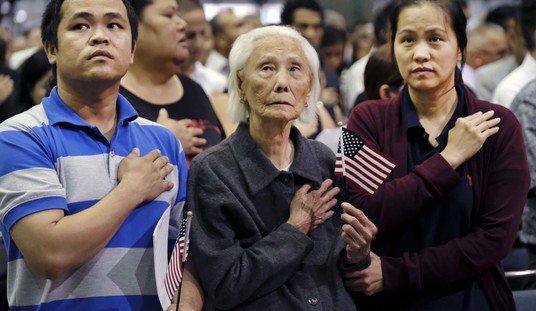(The opinions expressed by contributors are their own and do not necessarily represent the views of RedState.com.)
Earlier today, I posted on the saga of James LaPorta; see AP Fires Reporter for Erroneous Story on Russian Missile Strike in Poland.
Last week, LaPorta was the lead reporter on a “breaking” story that claimed Russian missiles had landed in Poland. The story was headlined “BREAKING: A senior U.S. intelligence official says Russian missiles crossed into NATO member Poland, killing two people.” I posted my take on the story in Russian Cruise Missile Explodes in Poland and Kills Two; Polish Government Calls Crisis Meeting.
As it turned out, the explosion in Poland was from a surface-to-air missile fired from a Ukrainian-operated launch unit during a massive missile blitz of cities throughout Ukraine.
The story was retracted, and Monday, the Associated Press fired LaPorta.
My previous post was primarily concerned with the failures that led to the publication of that story. Unfortunately, while researching the story, it became evident that some extraordinarily stupid things were said by people I think know better — but it is entirely possible that they don’t.
Media lies almost started World War III. AP journalist (now fired) James LaPorta falsely claimed that Russia fired missiles into Poland. This could've sparked Article 5 and ended the world as we know it. Twitter was the only thing that got in the way of this false narrative.
— Ian Miles Cheong (@stillgray) November 22, 2022
James LaPorta spread Biden disinformation that could have caused WW3
We now know Ukraine fired these missiles, not Russia
Will James LaPorta be suspended for spreading war propaganda @AP? pic.twitter.com/04N1LVicLS
— Jack Posobiec 🇺🇸 (@JackPosobiec) November 16, 2022
If there's one thing the AP fiasco should teach us, it's that World War 3 will start because of Slack. https://t.co/bZZqVp0KoT
— Anthony L. Fisher (@anthonyLfisher) November 22, 2022
AP's former reporter James Laporta basically tried to start World War 3.
Elon Musk says even AP won’t be banned despite ‘completely fictional report on Russian missiles hitting Poland’https://t.co/MayvtI3tKx
— Libby Emmons (@libbyemmons) November 22, 2022
Sadly, we see from AP’s internal communications that LaPorta and at least one of his colleagues, too, thought that Article 5 might be applicable in this case. I say sadly because this clown was supposed to be on the national security beat.
The most important thing to understand is that there was never any danger of the “World War 3” that the Putinists and their fellow travelers like to hyperventilate about. There is also no way in hell that the AP could stampede NATO into anything, much less military action against Russia. The main reason is that AP is not entrusted to do forensic investigations on behalf of NATO, and no matter what it writes, it has no impact on NATO decision-making.
Polish authorities had determined that the missile was fired from a Ukrainian launcher within hours, if not minutes, of the impact; read Preliminary Investigation Indicates Ukrainian Missile Landed in Poland.
Even if it had been a Russian missile, and even if it had been fired deliberately, that would not trigger a military response under Article 5. For mutual defense under Article 5 to be invoked, a consultation process with the member nations must occur. To understand what that looks like, let’s take a look at the process for the only time Article 5 has been used, that is, the aftermath of the 9/11 attack on the United States. For this account, I’m using an article in NATO Review by Ed Buckley, Assistant NATO Secretary General for Defence Planning and Operations from 1999 to 2003, called Invoking Article 5. It starts shortly after the Twin Towers are attacked.
The scene there was one of confusion. There were reports of unidentified or non-responding aircraft flying towards Brussels, though it was not clear how reliable the information was. The decision had indeed been taken to evacuate all non-essential personnel. Should the North Atlantic Council meet and if so where? It was decided that the Ambassadors would meet informally that evening in the Secretary General’s office. There would be a formal Council meeting the next day.
This was a case where nearly 3,000 people were killed, the Pentagon was struck, and no NATO action took place for 24 hours. Within just a few hours, Polish officials were hinting that they knew Russia had not launched the missile.
After 9/11, there was a debate inside NATO over whether an international terrorist attack was even an “armed attack” under the NATO treaty. Finally, the senior staff decided that it was just that.
At the Council, which had a very restricted attendance, all delegations spoke in favour of the strongest possible NATO response and almost all were ready to approve the draft statement, which had been circulated by the Secretary General in advance. A small group of nations asked, however, for legal clarification as to the effect of invoking Article 5. They had two main concerns. First, they wanted to ensure that their sovereign decision-making rights would not be affected as regards the nature, scale and timing of actions deemed necessary to restore peace and security – in other words they wanted it to be clear that each Ally would deem for itself what was “necessary”. Second, they wanted to ensure that any collective action taken by the Alliance, for example military action by NATO forces, would not be launched without specific additional consultation and decision in the Council.
Confident that these points could be quickly dealt with by NATO’s legal adviser, Baldwin De Vidts, the Secretary General adjourned the meeting until later in the day. When the Council reassembled, it did so with De Vidts’ reassuring memorandum in front of them. In effect, he concluded that it was up to each Ally to judge for itself what action needed to be taken, although such action should be appropriate to the scale of the attack, the means of each country and the steps necessary to restore peace and security. On the question of collective response, he said it was obvious that collective consultation would be necessary. With these clarifications, and after a short discussion, the Council unanimously agreed the draft statement as circulated. It was issued that evening and, in accordance with the Washington Treaty, Lord Robertson informed UN Secretary General Kofi Annan in parallel.
Even with the World Trade Center a smoking ruin, the primary concerns of the members were that they had the right to decide how much or how little they wished to participate, and they demanded further consultations before any decision on military action was made. It wasn’t until October 4 that Article 5 was officially invoked.
At no point after the November 15 missile strike was there any possibility that NATO was going to war with Russia. Even had the attack been deliberate, nothing would have changed. However, in the aftermath of the explosion, when Russia was a prime suspect, the Polish government asked for NATO consultations under Article 4:
“The Parties will consult together whenever, in the opinion of any of them, the territorial integrity, political independence or security of any of the Parties is threatened.”
Had Russia launched the missiles, Europe was not going to head to war over a missile strike, whether intentional or errant. Instead, an Article 4 consultation would have been held in the next couple of days. First, there would have been debate and position papers. Then, some weeks later, a decision that was not binding on all members would be announced. The outcome would have been political and economic sanctions.
I have no way of knowing why these people decided to grotesquely misrepresent the situation, but none of the possible scenarios speak very highly of anyone involved.













